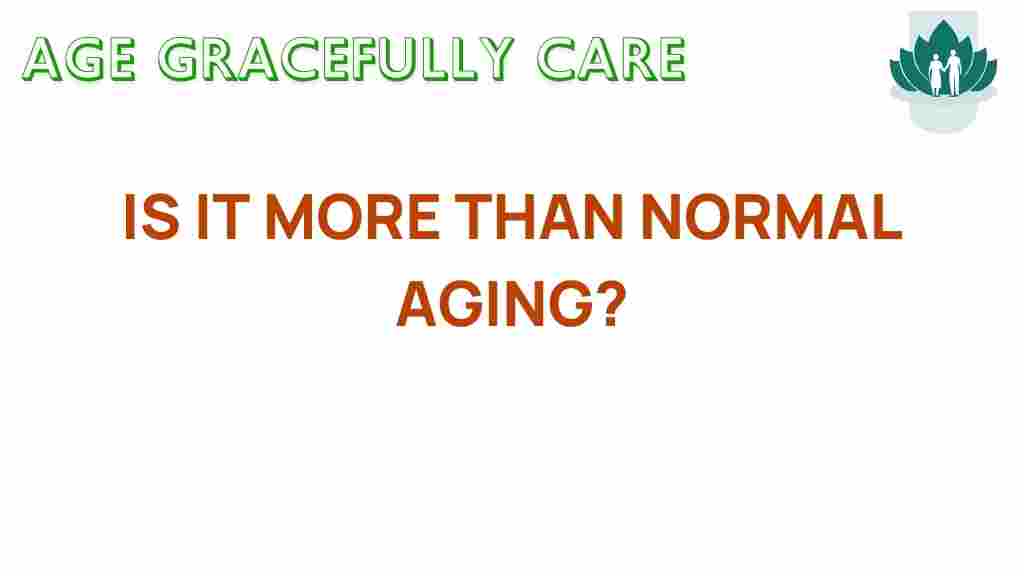Is It More Than Normal Aging? Understanding the Complexities of Aging
Aging is a natural process that every individual experiences, but the journey through the years can vary significantly from one person to another. While some may enjoy a vibrant and healthy life well into their later years, others may face challenges such as cognitive decline, emotional health issues, and physical ailments. The question arises: is it merely a part of normal aging, or is there more to it? In this article, we will unravel the mysteries of aging, focusing on health, wellness, lifestyle changes, longevity, gerontology, emotional health, and preventative care.
Aging and Its Impact on Health and Wellness
Aging affects everyone differently, and understanding its impact on health and wellness is crucial. As we age, our bodies undergo various changes that can affect our physical and mental well-being. Here are some common areas where aging has a significant impact:
- Physical Health: Muscle mass and bone density tend to decrease with age, leading to increased risks of falls and fractures.
- Cognitive Decline: Many individuals experience some level of cognitive decline, affecting memory and problem-solving abilities.
- Emotional Health: Aging can bring about feelings of isolation, depression, and anxiety, particularly in the absence of strong social support.
The Role of Lifestyle Changes in Promoting Longevity
Research in gerontology suggests that lifestyle choices play a pivotal role in determining the quality of life as we age. Implementing positive lifestyle changes can significantly enhance longevity and overall health. Here are some key lifestyle modifications to consider:
- Balanced Diet: A diet rich in fruits, vegetables, whole grains, and lean proteins can help maintain physical health and prevent chronic diseases.
- Regular Exercise: Engaging in regular physical activity strengthens muscles, improves balance, and enhances mood.
- Social Engagement: Maintaining social connections can improve emotional health and reduce feelings of loneliness.
- Stress Management: Techniques such as meditation, yoga, and deep breathing can help manage stress levels effectively.
Cognitive Decline: Recognizing the Signs
Cognitive decline is one of the most concerning aspects of aging for many people. While some degree of memory loss is normal, significant changes may indicate a more serious issue. Here are some signs to watch for:
- Difficulty recalling recent events or conversations
- Struggling to find words or follow conversations
- Confusion about time or place
- Changes in mood or personality
If you or a loved one is experiencing these symptoms, it is essential to consult a healthcare professional for a comprehensive evaluation. Early detection can lead to better management strategies and improve overall quality of life.
Emotional Health: The Overlooked Component of Aging
Emotional health is often overshadowed by physical health concerns, but it is equally important. As we age, emotional well-being can be challenged by various factors, including:
- Loss of loved ones
- Retirement and loss of purpose
- Chronic health issues
To maintain emotional health, consider the following strategies:
- Stay Connected: Regularly interact with friends and family to foster a sense of belonging.
- Pursue Hobbies: Engage in activities that bring joy and fulfillment.
- Seek Professional Help: Therapy or counseling can provide valuable support in managing emotional challenges.
Preventative Care: A Key to Healthy Aging
Preventative care is essential in managing health as we age. It includes regular check-ups, screenings, and vaccinations that can help detect potential health issues early on. Here are some crucial aspects of preventative care:
- Regular Health Screenings: Routine screenings for blood pressure, cholesterol, and cancer can help catch health problems early.
- Vaccinations: Staying up-to-date on vaccinations can prevent illnesses that become riskier with age.
- Healthy Lifestyle Choices: Quitting smoking, moderating alcohol intake, and maintaining a healthy weight are essential preventative measures.
Creating a Personal Wellness Plan
To optimize health as you age, creating a personalized wellness plan is beneficial. Here’s a step-by-step process to consider:
- Assess Your Current Health: Consult with a healthcare professional to evaluate your health status and identify any areas for improvement.
- Set Realistic Goals: Establish manageable health and wellness goals, such as losing a certain amount of weight or exercising for a specific number of minutes each week.
- Develop a Routine: Incorporate healthy habits into your daily routine, such as meal planning and scheduling regular exercise.
- Monitor Your Progress: Keep track of your achievements and adjust your plan as necessary to stay on track.
- Seek Support: Consider joining a support group or enlisting friends and family to help keep you motivated.
Troubleshooting Common Aging Concerns
As you navigate the challenges of aging, you may encounter specific issues that require troubleshooting. Here are some common concerns and solutions:
- Cognitive Decline: Engage in brain exercises, such as puzzles and memory games, to stimulate mental activity.
- Physical Limitations: Adapt your exercise routine to include low-impact activities, such as walking or swimming.
- Social Isolation: Join clubs or community groups to meet new people and build connections.
- Emotional Distress: Practice mindfulness and seek therapy if feelings of sadness or anxiety persist.
Resources for Aging Well
To further support your journey in healthy aging, consider exploring the following resources:
- National Institute on Aging: A comprehensive resource for information on aging research and health.
- CDC Healthy Aging: Offers tools and resources to promote healthy aging.
- Local community centers often provide wellness programs and social activities for seniors.
Conclusion: Embracing the Journey of Aging
Aging is an inevitable part of life, but it does not have to mean a decline in health or happiness. By understanding the complexities of aging and taking proactive steps to enhance your health and wellness, you can enjoy a fulfilling and vibrant life. Remember, it is essential to focus on cognitive decline, emotional health, and preventative care as you age. Embrace the journey, make informed lifestyle changes, and prioritize your well-being for a healthier, longer life.
This article is in the category Health and created by AgeGracefullyCare Team
